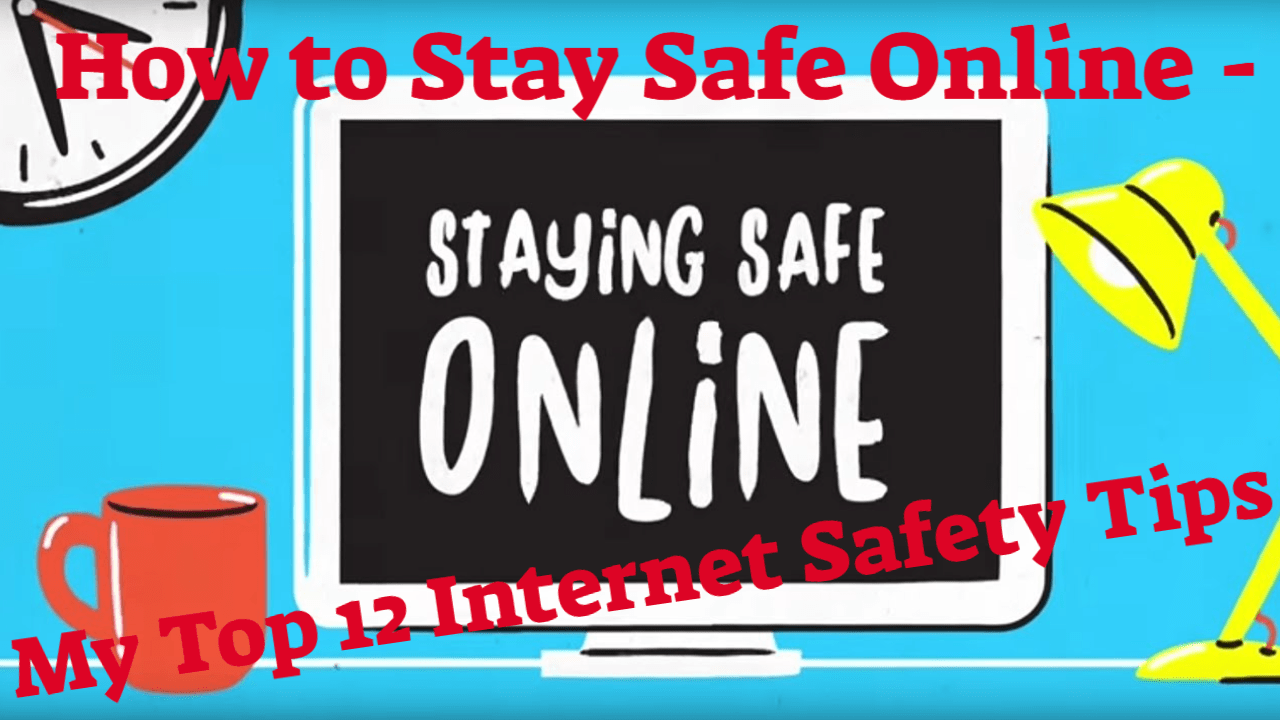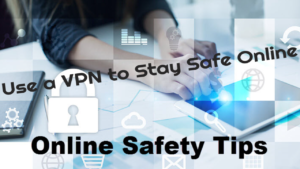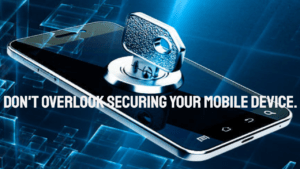Navigating the Web – How to Stay Safe Online
How to Stay Safe Online – My Top 12 Internet Safety Tips: When contemplating “how to stay safe online,” one must first consider all of the various ways we use the internet. Current affairs, banking, shopping, conducting business, listening to music, and staying in touch with friends and family are all likely on that list.
While increased internet connectivity simplifies many elements of our daily life, it also increases our vulnerability to theft, fraud, and abuse. It's never been more critical to understand how to keep secure online.
Identity theft is one of America's fastest-growing crimes, with roughly 10 million occurrences reported each year. While there is no surefire method of preventing identity theft, there are several precautions we can take to reduce our chances of being victims.
With viruses, hackers, and frauds on the rise, it may appear that keeping yourself and your information as safe as possible is impossible, or that there is a price barrier preventing you from getting the protection you need.
Although many of the tools supplied by premium security businesses are good, you should also investigate alternative options and tactics in your quest to learn “how to stay safe online.”
What are the Potential Dangers of the Internet?
Among the most common online hazards are cybercriminals and the ever-changing crimes they commit. Because so many cybercrimes are committed against anyone who uses the internet, no one in your family is safe. Children, like adults and teenagers, are vulnerable to a variety of hazards.
To stay secure online, the entire family must be educated on recognising and avoiding each cyber hazard. Here are a few of the most common internet dangers or potential threats to be aware of:
• Online predators • Inadequate privacy settings • Scamming • Online con artists • Viruses • Inappropriate content • Identity theft
1. Create Passwords That Are Both Strong and Unique (My Top 12 Online Safety Tips)
In our effort to stay safe online, the need to choose strong and unique passwords comes first and foremost.
It's all too easy to create passwords that are easy to remember by using common words, phrases, or names, but even a few capital letters, symbols, or numerals won't keep your password safe.
Not only should your passwords be unique and difficult to guess, but they should also be different for each account and website you use. Using multiple passwords is critical because if one of your accounts is hacked or a database is stolen, you may lose access to all of your accounts.
You can reasonably accurately test your password strength using this excellent LastPass tool, which can even give you ideas and ways to help you improve your passwords.
If you have a number of different accounts, like me, using a difficult-to-remember password for each one may be a challenge and a reason you don't follow this advice. There is, however, password management software that you may use to make things quick and simple in that case.
You may use LastPass or another free password management tool to keep track of all of your passwords, and you can use them across many devices to make it easier to log into your accounts on your tablet, phone, or laptop. LastPass can be downloaded and installed on your devices, or it can be used as a Chrome browser extension.
To access Lastpass, you must first create a strong and memorable password. The app will then allow you to save and enter passwords for different websites and accounts. LastPass features a password generator to help you create strong passwords and rapidly save them.
2. Avoid Untrustworthy and Insecure Websites.
SSL is an additional encryption layer that a website provides to prevent hackers from accessing your data. Checking to see if the website uses SSL is a good habit to develop. If you don't recognise or trust a website, it's usually best to ignore it entirely or not submit any personal information on it.
If the URL begins with “HTTPS” rather than “HTTP,” the website is secure. In addition to the web URL, a padlock or the phrase “secure” may show. If you prefer Chrome, you may check the status of the certificate by clicking on the padlock, or you can investigate the site by hitting Ctrl + Shift + I on a web page and then navigating to the security area.
3. Make Sure you’re Using a Secure Web Browser.

Using a secure web browser is another must-do in our efforts to stay safe online.
Using a safe browser avoids certain behaviours from occurring in the first place, making it a more proactive approach to internet security, even more so than anti-spyware and antivirus software, which just reacts after a threat is found.
Safe browsers aid in the removal of third-party technology such as cookies. Cookies save personal information such as visited websites, usernames and passwords, and other tracking data.
Unlike some of their less secure counterparts, safe browsers do not reveal your identity. Through leaks or browser fingerprinting, your browser can still reveal your identity. Even if you use a VPN, you are just masking your IP address, location, and data in transit.
Although this may appear to be concerning, you may protect your online identity by using secure browsers in conjunction with a VPN.
As two of the most secure web browsers, I recommend Firefox and Google Chrome.
4. It's a Good Idea to Use Two-Factor Authentication.
Given how readily hackers may obtain password and login combinations, it's no surprise that data breaches occur on a daily basis. When this occurs, two-factor authentication is the most effective method of safeguarding your sensitive data.
Two-factor authentication (commonly known as 2FA) increases the security of your online accounts. Account access necessitates the use of a second login credential in addition to the username and password and obtaining the second credential is a requirement for accessing anything that belongs to you.
It is impossible to access the account without this additional authentication mechanism, making it extremely difficult for fraudsters to obtain access to your account using only stolen passwords and login credentials.
5. Don't Give Out Your Personal Information.
It's all too easy to get caught up in the habit of sharing too much personal information online. You might be amazed at how much damage fraudsters can cause with a small amount of information.
To keep your personal information secure, never give it to strangers you meet online, such as your complete name, address, or bank account number. It would also be beneficial if you were cautious when creating usernames for websites; they do not have to include your whole name.
Limit the quantity of information you provide in online questionnaires or forms. Most of the time, only a few bits of personal information are required to complete the transaction.
Staying secure online may appear difficult, but it does not have to be. If you're still learning how to protect yourself from online predators or fraudsters, consider internet interactions as if they were with a stranger you met while walking down the street. To put it another way, you are unlikely to open anything they hand you, hand them your credit card, or tell them your home address. The same standards will keep you safe when you're browsing the web.
6. Use a VPN to stay safe online.
Coffee shops, like hotels and other Wi-Fi hotspots, have public networks that could pose a significant security risk. Hackers accessing the same public Wi-Fi network can intercept information that is not otherwise safeguarded. The easiest way for folks who work from public Wi-Fi to be safe on the internet is to buy a VPN.
A Virtual Private Network (VPN) is a low-cost way to acquire privacy and security while accessing the internet.

If you use a VPN, your internet service provider or any other third party will not be able to see which websites you visit or what information you supply. A VPN conceals your IP address by routing it through a specially configured distant server operated by the VPN host. As a result, when you use a VPN to connect to the internet, the VPN server becomes your data source.
A virtual private network (VPN) acts as a filter, converting all data sent and received into gibberish. Even if this knowledge were available, it would be meaningless.
7. Use Caution When Dealing With Phishing and Malicious Emails
Be cautious when opening and clicking links in emails, regardless of how legitimate the email appears to be. There's a chance it was delivered from a bogus sender address to appear as if it came from the firm you claimed to have purchased it from.
These emails often suggest that your account has been hacked and attempt to persuade you to download a file or follow instructions once you click on a link in the email.
If you click the link to a phishing website that appears to be identical to the legitimate site and even has a URL that appears credible at first sight, you will almost probably be redirected.
To avoid handing over personal information or having your accounts hijacked, open your browser and navigate to the site in question; from there, you may try to sign in or even contact the firm to see if the email is genuine.
8. Back up your data on a regular basis.
If you become a victim of a virus, such as ransomware, you may be unable to retrieve your data unless you have already backed up your data.
Backing up your data may assist you in avoiding some types of security breaches. If a hacker encrypts your data and demands a ransom to recover it, it won't matter if you backed it up just a week ago.
9. Exercise Extreme Caution When Downloading
Another general rule for staying secure online is to only download from websites you know and trust. Everything you download from major organisations like your bank, insurance company, or government should be secure.
What about the rest of the websites on the internet?
It may be tempting to download new software or files from the internet, especially if they are free; however, before doing so, look for anything suspect.
For example, if you want a free download from a video, read the comments and consider the like-to-dislike ratio. Of course, it's best to avoid the risk and avoid any drama by not downloading the file if there are a lot of comments claiming the file is dangerous, a lot of dislikes, or the comments are disabled.
10. How to Stay Safe Online – Protect Your Mobile Device
Viruses and other types of malware are well-known for posing hazards and wreaking havoc on computers, but malicious malware is increasingly targeting our mobile devices.

Threats are constantly evolving and adapting. Spyware can infiltrate your mobile device in a number of ways.
Any malicious software that gets into your device, regardless of its type, can have serious consequences, such as stealing your credit card information or permanently damaging your photographs. Malicious software has the potential to permanently damage your gadget, rendering it useless and irreparable.
11. Check to see if your antivirus software is up to date.
Programs can be updated to include new features. Nonetheless, they are routinely updated to address programme flaws and prevent hackers from exploiting them to get unauthorised data access. Most apps have an auto-update feature that you can enable; if it is disabled by default, you can enable it or search up how to do so online.
You should be concerned about more than just the apps on your device; if you intend to install new software on your computer, you should conduct some research first. Check the app's reviews to see if it's still supported and getting regular updates.
Similarly, it is critical to maintaining your antivirus software up to date at all times. These updates are made available on a regular basis to assist them in improving the present database and recognising and eliminating new possible dangers or harmful software that may be circulating.
Finally, get commercial-grade antivirus software.
The added security and peace of mind afforded by upgrading from free antivirus software to a full internet security solution is well worth the expense.
Data that enters your computer via the internet is scanned by security software. When the software finds a potentially hazardous file, it prevents it from being downloaded to your computer. One of the most effective ransomware protection tactics is to use commercial-grade antivirus software.
Commercial-grade security software evaluates threat profiles and malicious file types to determine which are potentially hazardous to your machine. To keep current, security software frequently necessitates upgrades. When new threats are detected, the update is automatically updated to include their profiles. The provider will install them automatically.
I Recommend Commercial-Grade Antivirus Software
Sophos Home Premium, developed by Sophos Limited, a British corporation specialising in digital security, is my go-to for internet security.
The security organisation focuses on award-winning consumer and enterprise security and privacy products, as well as next-generation protection, mobile security and management, network, server, and endpoint protection.
To keep track of programme actions on your personal PC, Sophos Home Premium employs the same advanced artificial intelligence utilised in professional ransomware security solutions for large companies experiencing active ransomware threats. It determines whether or not the programme on your computer exhibits specified ransomware features.
Sophos Home Premium is capable of detecting and removing previously unseen ransomware.
Sophos now offers ransomware protection for home PCs with the same level of security as it delivers for over 300 million business devices worldwide.
This award-winning antivirus software guards against ransomware by leveraging SophosLabs' massive, constantly updated threat library to provide the most effective ransomware protection available today.
How to stay safe online? Visit this page to learn more about Sopho’s business-grade ransomware protection for home PCs.
The post, How to Stay Safe Online – My Top 12 Internet Safety Tips first appeared on: https://websecurityhome.com/
Brought To You By:
The post How to Stay Safe Online – My Top 12 Internet Safety Tips appeared first on https://cable13.com
The post How to Stay Safe Online – My Top 12 Internet Safety Tips appeared first on https://gqcentral.co.uk





Comments are closed